Professional Aspects of Care: Nursing Partnerships and Conflicts
VerifiedAdded on 2020/02/03
|10
|3085
|33
Report
AI Summary
This report delves into the professional dimensions of nursing within a healthcare setting, emphasizing the delivery of high-quality patient care. It examines the essential skills required for nurses to establish effective partnerships with patients, including communication, critical thinking, and conflict resolution. The report addresses areas of conflict that can affect these partnerships, such as communication challenges and differing expectations. Furthermore, it outlines crucial legal and ethical principles, including the duty of care and the importance of maintaining patient confidentiality. The report highlights the significance of professional values, healthcare policies, and therapeutic relationships in fostering trust and delivering comprehensive patient care. The information provided will assist students in understanding the core principles and practices of professional nursing.
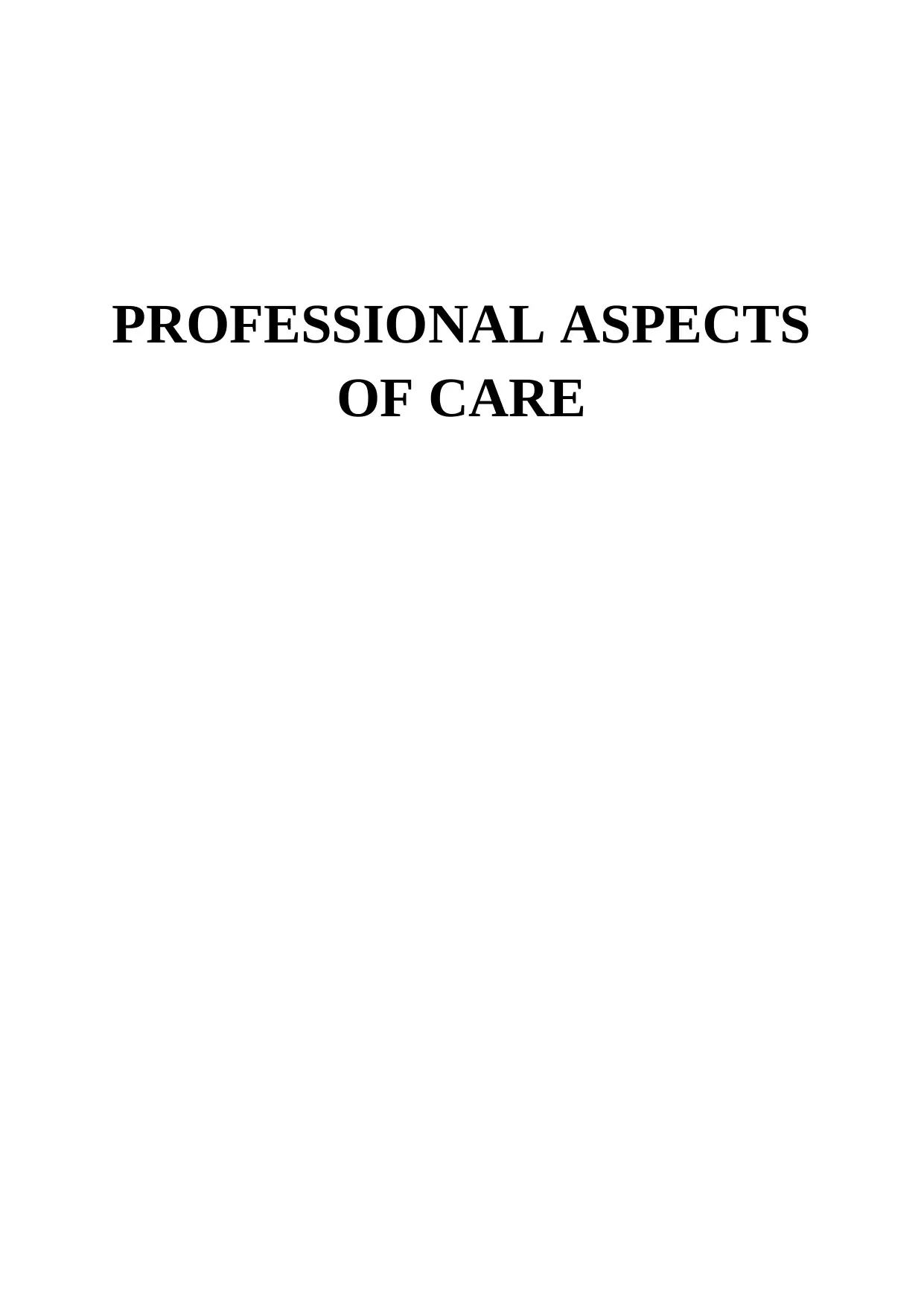
PROFESSIONAL ASPECTS
OF CARE
OF CARE
Paraphrase This Document
Need a fresh take? Get an instant paraphrase of this document with our AI Paraphraser
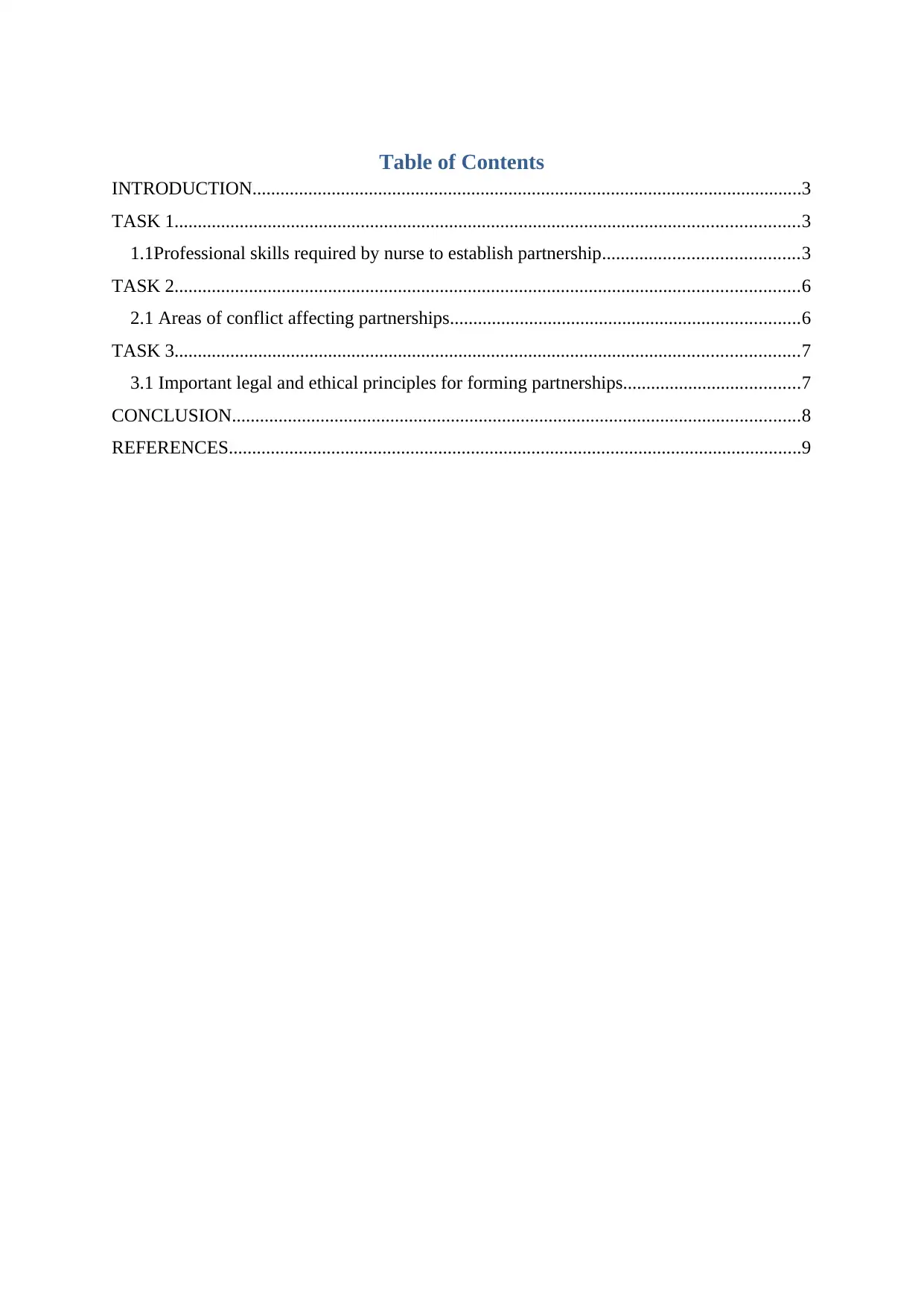
Table of Contents
INTRODUCTION......................................................................................................................3
TASK 1......................................................................................................................................3
1.1Professional skills required by nurse to establish partnership..........................................3
TASK 2......................................................................................................................................6
2.1 Areas of conflict affecting partnerships...........................................................................6
TASK 3......................................................................................................................................7
3.1 Important legal and ethical principles for forming partnerships......................................7
CONCLUSION..........................................................................................................................8
REFERENCES...........................................................................................................................9
INTRODUCTION......................................................................................................................3
TASK 1......................................................................................................................................3
1.1Professional skills required by nurse to establish partnership..........................................3
TASK 2......................................................................................................................................6
2.1 Areas of conflict affecting partnerships...........................................................................6
TASK 3......................................................................................................................................7
3.1 Important legal and ethical principles for forming partnerships......................................7
CONCLUSION..........................................................................................................................8
REFERENCES...........................................................................................................................9
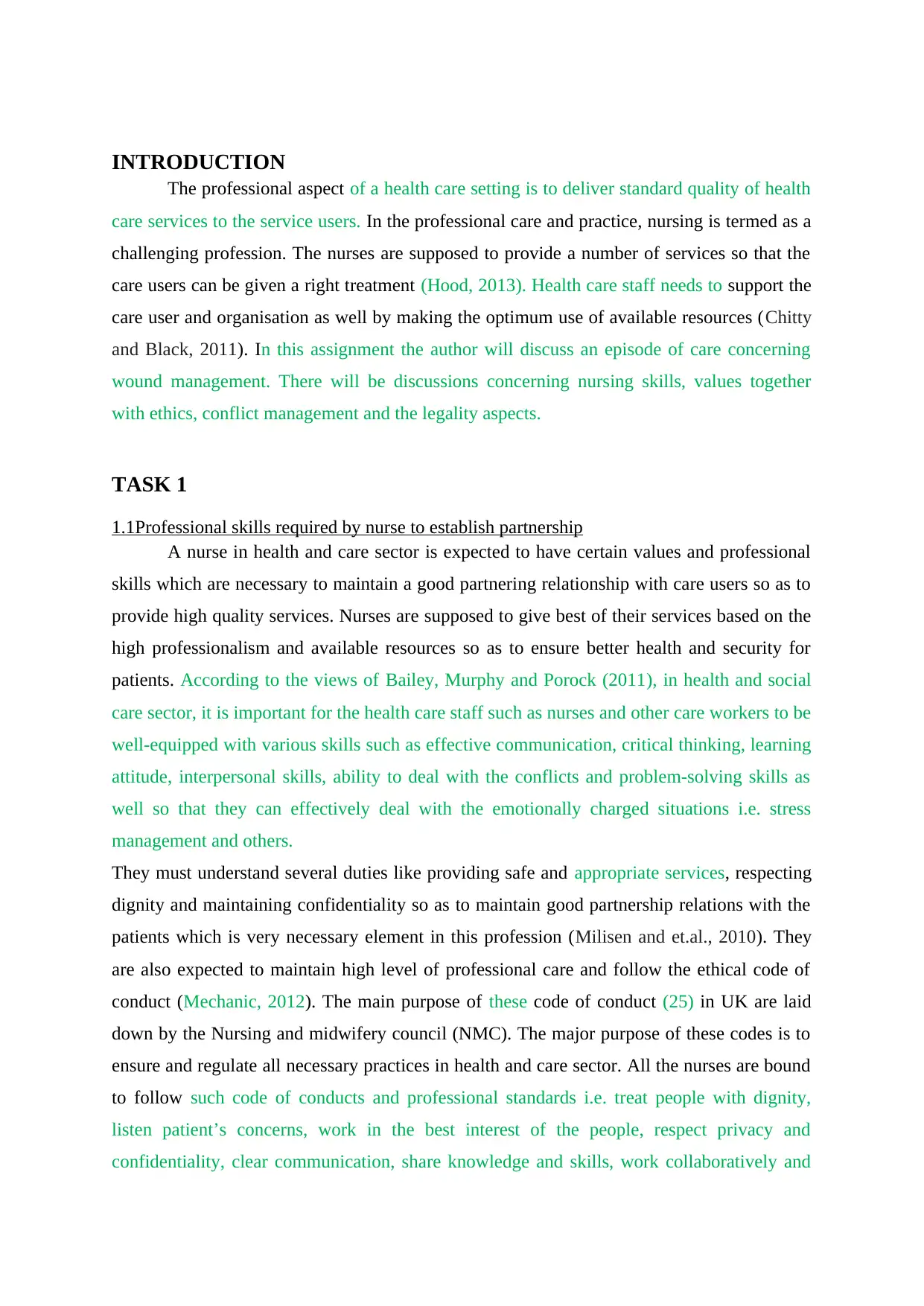
INTRODUCTION
The professional aspect of a health care setting is to deliver standard quality of health
care services to the service users. In the professional care and practice, nursing is termed as a
challenging profession. The nurses are supposed to provide a number of services so that the
care users can be given a right treatment (Hood, 2013). Health care staff needs to support the
care user and organisation as well by making the optimum use of available resources (Chitty
and Black, 2011). In this assignment the author will discuss an episode of care concerning
wound management. There will be discussions concerning nursing skills, values together
with ethics, conflict management and the legality aspects.
TASK 1
1.1Professional skills required by nurse to establish partnership
A nurse in health and care sector is expected to have certain values and professional
skills which are necessary to maintain a good partnering relationship with care users so as to
provide high quality services. Nurses are supposed to give best of their services based on the
high professionalism and available resources so as to ensure better health and security for
patients. According to the views of Bailey, Murphy and Porock (2011), in health and social
care sector, it is important for the health care staff such as nurses and other care workers to be
well-equipped with various skills such as effective communication, critical thinking, learning
attitude, interpersonal skills, ability to deal with the conflicts and problem-solving skills as
well so that they can effectively deal with the emotionally charged situations i.e. stress
management and others.
They must understand several duties like providing safe and appropriate services, respecting
dignity and maintaining confidentiality so as to maintain good partnership relations with the
patients which is very necessary element in this profession (Milisen and et.al., 2010). They
are also expected to maintain high level of professional care and follow the ethical code of
conduct (Mechanic, 2012). The main purpose of these code of conduct (25) in UK are laid
down by the Nursing and midwifery council (NMC). The major purpose of these codes is to
ensure and regulate all necessary practices in health and care sector. All the nurses are bound
to follow such code of conducts and professional standards i.e. treat people with dignity,
listen patient’s concerns, work in the best interest of the people, respect privacy and
confidentiality, clear communication, share knowledge and skills, work collaboratively and
The professional aspect of a health care setting is to deliver standard quality of health
care services to the service users. In the professional care and practice, nursing is termed as a
challenging profession. The nurses are supposed to provide a number of services so that the
care users can be given a right treatment (Hood, 2013). Health care staff needs to support the
care user and organisation as well by making the optimum use of available resources (Chitty
and Black, 2011). In this assignment the author will discuss an episode of care concerning
wound management. There will be discussions concerning nursing skills, values together
with ethics, conflict management and the legality aspects.
TASK 1
1.1Professional skills required by nurse to establish partnership
A nurse in health and care sector is expected to have certain values and professional
skills which are necessary to maintain a good partnering relationship with care users so as to
provide high quality services. Nurses are supposed to give best of their services based on the
high professionalism and available resources so as to ensure better health and security for
patients. According to the views of Bailey, Murphy and Porock (2011), in health and social
care sector, it is important for the health care staff such as nurses and other care workers to be
well-equipped with various skills such as effective communication, critical thinking, learning
attitude, interpersonal skills, ability to deal with the conflicts and problem-solving skills as
well so that they can effectively deal with the emotionally charged situations i.e. stress
management and others.
They must understand several duties like providing safe and appropriate services, respecting
dignity and maintaining confidentiality so as to maintain good partnership relations with the
patients which is very necessary element in this profession (Milisen and et.al., 2010). They
are also expected to maintain high level of professional care and follow the ethical code of
conduct (Mechanic, 2012). The main purpose of these code of conduct (25) in UK are laid
down by the Nursing and midwifery council (NMC). The major purpose of these codes is to
ensure and regulate all necessary practices in health and care sector. All the nurses are bound
to follow such code of conducts and professional standards i.e. treat people with dignity,
listen patient’s concerns, work in the best interest of the people, respect privacy and
confidentiality, clear communication, share knowledge and skills, work collaboratively and
⊘ This is a preview!⊘
Do you want full access?
Subscribe today to unlock all pages.

Trusted by 1+ million students worldwide
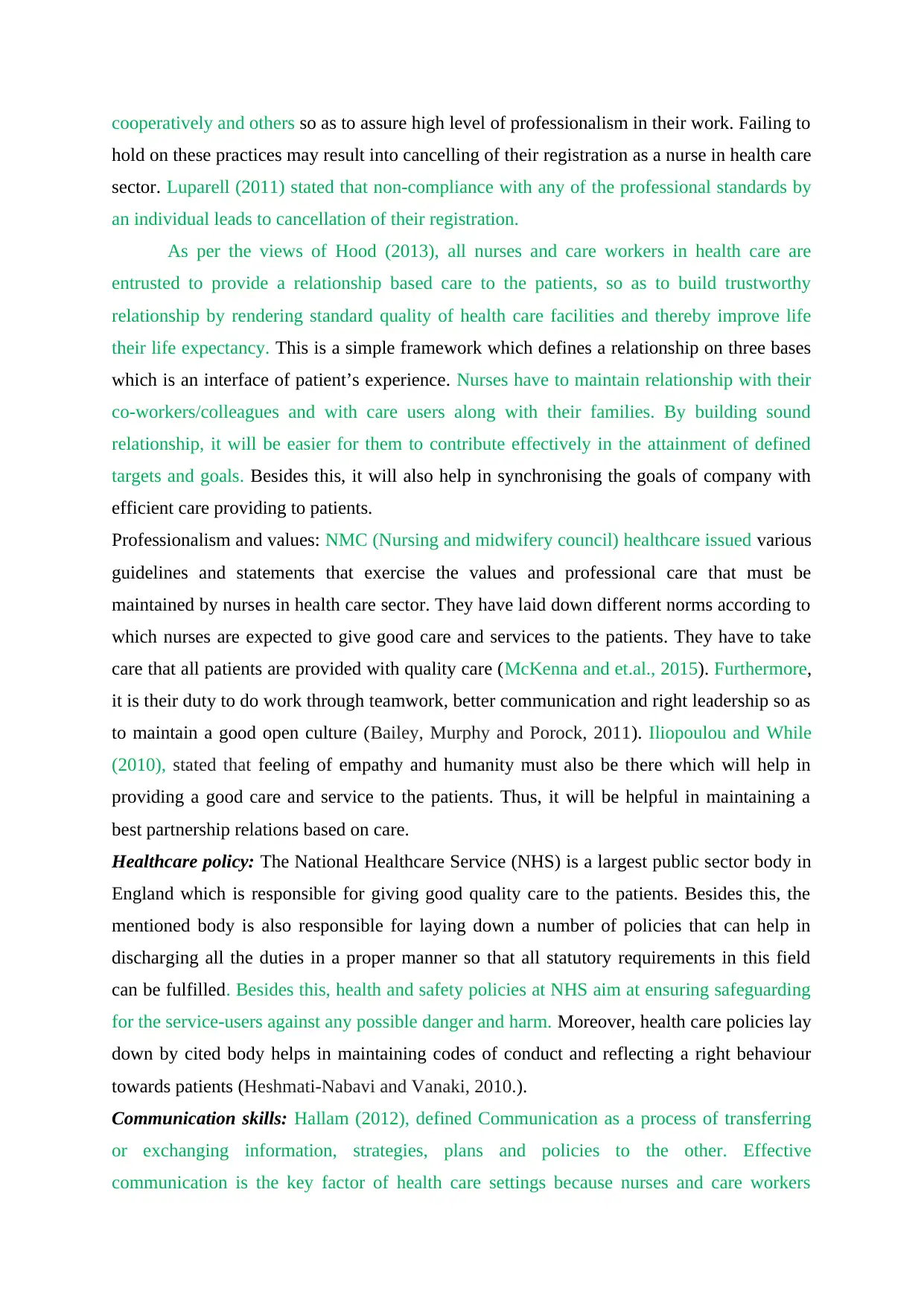
cooperatively and others so as to assure high level of professionalism in their work. Failing to
hold on these practices may result into cancelling of their registration as a nurse in health care
sector. Luparell (2011) stated that non-compliance with any of the professional standards by
an individual leads to cancellation of their registration.
As per the views of Hood (2013), all nurses and care workers in health care are
entrusted to provide a relationship based care to the patients, so as to build trustworthy
relationship by rendering standard quality of health care facilities and thereby improve life
their life expectancy. This is a simple framework which defines a relationship on three bases
which is an interface of patient’s experience. Nurses have to maintain relationship with their
co-workers/colleagues and with care users along with their families. By building sound
relationship, it will be easier for them to contribute effectively in the attainment of defined
targets and goals. Besides this, it will also help in synchronising the goals of company with
efficient care providing to patients.
Professionalism and values: NMC (Nursing and midwifery council) healthcare issued various
guidelines and statements that exercise the values and professional care that must be
maintained by nurses in health care sector. They have laid down different norms according to
which nurses are expected to give good care and services to the patients. They have to take
care that all patients are provided with quality care (McKenna and et.al., 2015). Furthermore,
it is their duty to do work through teamwork, better communication and right leadership so as
to maintain a good open culture (Bailey, Murphy and Porock, 2011). Iliopoulou and While
(2010), stated that feeling of empathy and humanity must also be there which will help in
providing a good care and service to the patients. Thus, it will be helpful in maintaining a
best partnership relations based on care.
Healthcare policy: The National Healthcare Service (NHS) is a largest public sector body in
England which is responsible for giving good quality care to the patients. Besides this, the
mentioned body is also responsible for laying down a number of policies that can help in
discharging all the duties in a proper manner so that all statutory requirements in this field
can be fulfilled. Besides this, health and safety policies at NHS aim at ensuring safeguarding
for the service-users against any possible danger and harm. Moreover, health care policies lay
down by cited body helps in maintaining codes of conduct and reflecting a right behaviour
towards patients (Heshmati-Nabavi and Vanaki, 2010.).
Communication skills: Hallam (2012), defined Communication as a process of transferring
or exchanging information, strategies, plans and policies to the other. Effective
communication is the key factor of health care settings because nurses and care workers
hold on these practices may result into cancelling of their registration as a nurse in health care
sector. Luparell (2011) stated that non-compliance with any of the professional standards by
an individual leads to cancellation of their registration.
As per the views of Hood (2013), all nurses and care workers in health care are
entrusted to provide a relationship based care to the patients, so as to build trustworthy
relationship by rendering standard quality of health care facilities and thereby improve life
their life expectancy. This is a simple framework which defines a relationship on three bases
which is an interface of patient’s experience. Nurses have to maintain relationship with their
co-workers/colleagues and with care users along with their families. By building sound
relationship, it will be easier for them to contribute effectively in the attainment of defined
targets and goals. Besides this, it will also help in synchronising the goals of company with
efficient care providing to patients.
Professionalism and values: NMC (Nursing and midwifery council) healthcare issued various
guidelines and statements that exercise the values and professional care that must be
maintained by nurses in health care sector. They have laid down different norms according to
which nurses are expected to give good care and services to the patients. They have to take
care that all patients are provided with quality care (McKenna and et.al., 2015). Furthermore,
it is their duty to do work through teamwork, better communication and right leadership so as
to maintain a good open culture (Bailey, Murphy and Porock, 2011). Iliopoulou and While
(2010), stated that feeling of empathy and humanity must also be there which will help in
providing a good care and service to the patients. Thus, it will be helpful in maintaining a
best partnership relations based on care.
Healthcare policy: The National Healthcare Service (NHS) is a largest public sector body in
England which is responsible for giving good quality care to the patients. Besides this, the
mentioned body is also responsible for laying down a number of policies that can help in
discharging all the duties in a proper manner so that all statutory requirements in this field
can be fulfilled. Besides this, health and safety policies at NHS aim at ensuring safeguarding
for the service-users against any possible danger and harm. Moreover, health care policies lay
down by cited body helps in maintaining codes of conduct and reflecting a right behaviour
towards patients (Heshmati-Nabavi and Vanaki, 2010.).
Communication skills: Hallam (2012), defined Communication as a process of transferring
or exchanging information, strategies, plans and policies to the other. Effective
communication is the key factor of health care settings because nurses and care workers
Paraphrase This Document
Need a fresh take? Get an instant paraphrase of this document with our AI Paraphraser
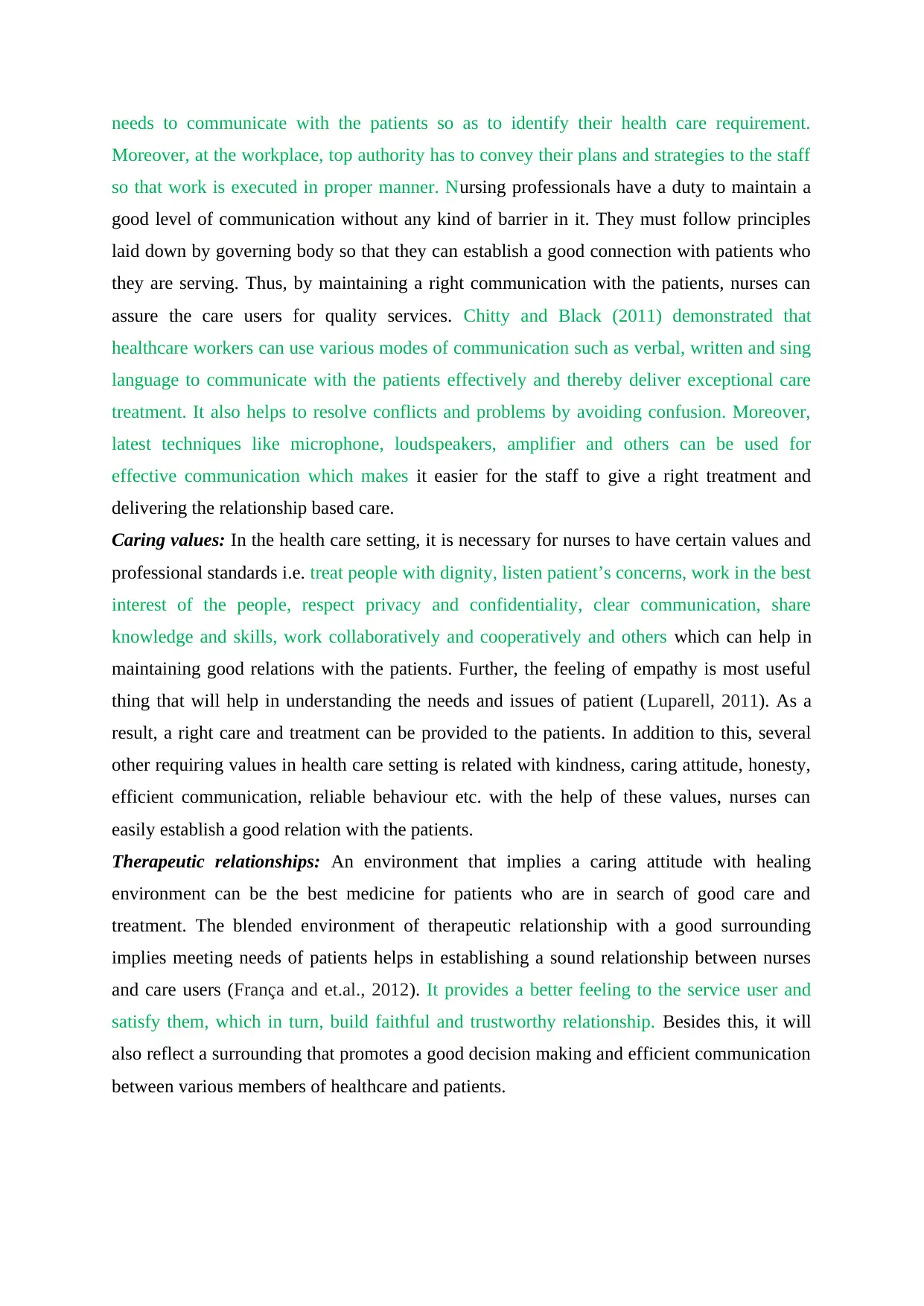
needs to communicate with the patients so as to identify their health care requirement.
Moreover, at the workplace, top authority has to convey their plans and strategies to the staff
so that work is executed in proper manner. Nursing professionals have a duty to maintain a
good level of communication without any kind of barrier in it. They must follow principles
laid down by governing body so that they can establish a good connection with patients who
they are serving. Thus, by maintaining a right communication with the patients, nurses can
assure the care users for quality services. Chitty and Black (2011) demonstrated that
healthcare workers can use various modes of communication such as verbal, written and sing
language to communicate with the patients effectively and thereby deliver exceptional care
treatment. It also helps to resolve conflicts and problems by avoiding confusion. Moreover,
latest techniques like microphone, loudspeakers, amplifier and others can be used for
effective communication which makes it easier for the staff to give a right treatment and
delivering the relationship based care.
Caring values: In the health care setting, it is necessary for nurses to have certain values and
professional standards i.e. treat people with dignity, listen patient’s concerns, work in the best
interest of the people, respect privacy and confidentiality, clear communication, share
knowledge and skills, work collaboratively and cooperatively and others which can help in
maintaining good relations with the patients. Further, the feeling of empathy is most useful
thing that will help in understanding the needs and issues of patient (Luparell, 2011). As a
result, a right care and treatment can be provided to the patients. In addition to this, several
other requiring values in health care setting is related with kindness, caring attitude, honesty,
efficient communication, reliable behaviour etc. with the help of these values, nurses can
easily establish a good relation with the patients.
Therapeutic relationships: An environment that implies a caring attitude with healing
environment can be the best medicine for patients who are in search of good care and
treatment. The blended environment of therapeutic relationship with a good surrounding
implies meeting needs of patients helps in establishing a sound relationship between nurses
and care users (França and et.al., 2012). It provides a better feeling to the service user and
satisfy them, which in turn, build faithful and trustworthy relationship. Besides this, it will
also reflect a surrounding that promotes a good decision making and efficient communication
between various members of healthcare and patients.
Moreover, at the workplace, top authority has to convey their plans and strategies to the staff
so that work is executed in proper manner. Nursing professionals have a duty to maintain a
good level of communication without any kind of barrier in it. They must follow principles
laid down by governing body so that they can establish a good connection with patients who
they are serving. Thus, by maintaining a right communication with the patients, nurses can
assure the care users for quality services. Chitty and Black (2011) demonstrated that
healthcare workers can use various modes of communication such as verbal, written and sing
language to communicate with the patients effectively and thereby deliver exceptional care
treatment. It also helps to resolve conflicts and problems by avoiding confusion. Moreover,
latest techniques like microphone, loudspeakers, amplifier and others can be used for
effective communication which makes it easier for the staff to give a right treatment and
delivering the relationship based care.
Caring values: In the health care setting, it is necessary for nurses to have certain values and
professional standards i.e. treat people with dignity, listen patient’s concerns, work in the best
interest of the people, respect privacy and confidentiality, clear communication, share
knowledge and skills, work collaboratively and cooperatively and others which can help in
maintaining good relations with the patients. Further, the feeling of empathy is most useful
thing that will help in understanding the needs and issues of patient (Luparell, 2011). As a
result, a right care and treatment can be provided to the patients. In addition to this, several
other requiring values in health care setting is related with kindness, caring attitude, honesty,
efficient communication, reliable behaviour etc. with the help of these values, nurses can
easily establish a good relation with the patients.
Therapeutic relationships: An environment that implies a caring attitude with healing
environment can be the best medicine for patients who are in search of good care and
treatment. The blended environment of therapeutic relationship with a good surrounding
implies meeting needs of patients helps in establishing a sound relationship between nurses
and care users (França and et.al., 2012). It provides a better feeling to the service user and
satisfy them, which in turn, build faithful and trustworthy relationship. Besides this, it will
also reflect a surrounding that promotes a good decision making and efficient communication
between various members of healthcare and patients.
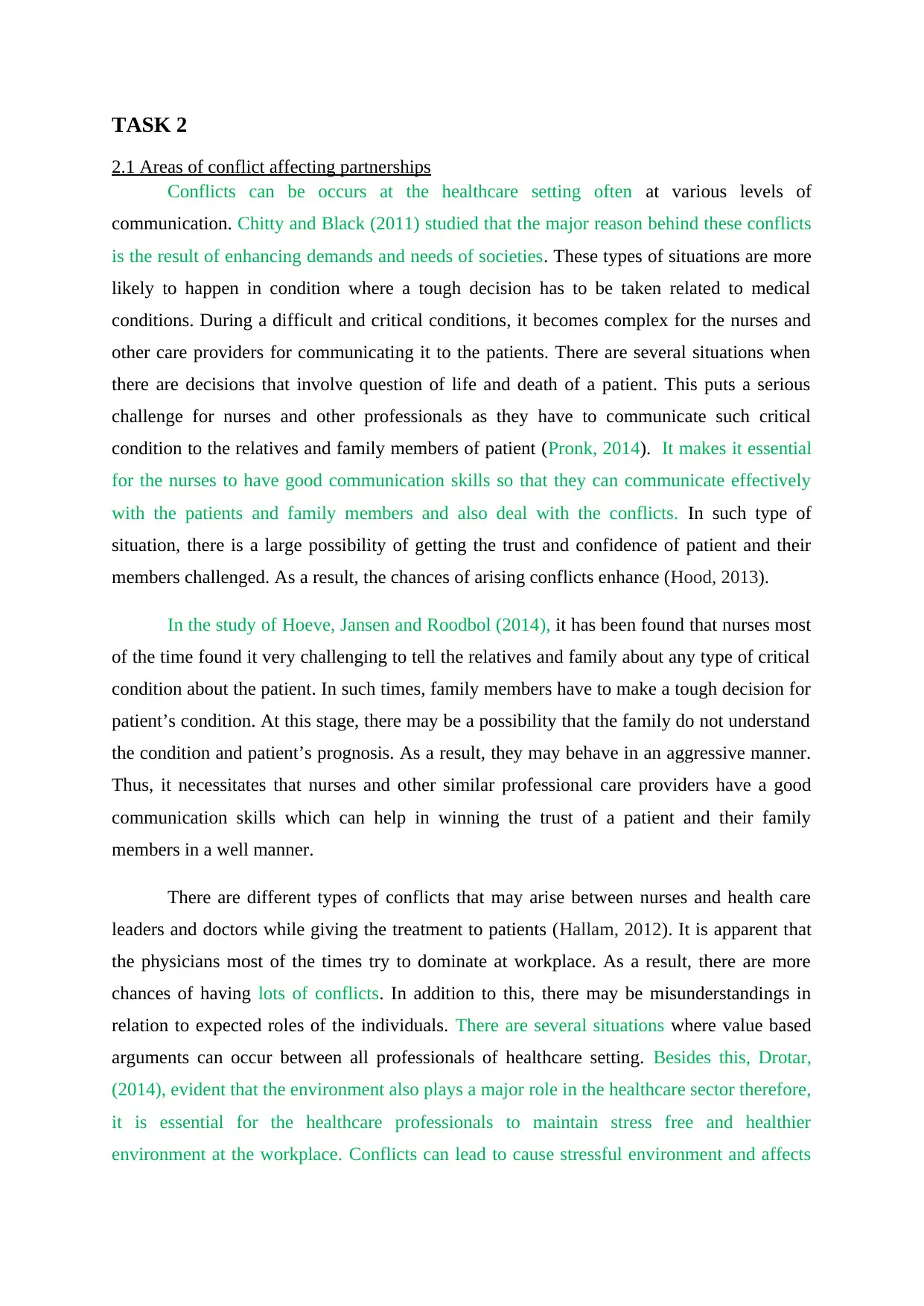
TASK 2
2.1 Areas of conflict affecting partnerships
Conflicts can be occurs at the healthcare setting often at various levels of
communication. Chitty and Black (2011) studied that the major reason behind these conflicts
is the result of enhancing demands and needs of societies. These types of situations are more
likely to happen in condition where a tough decision has to be taken related to medical
conditions. During a difficult and critical conditions, it becomes complex for the nurses and
other care providers for communicating it to the patients. There are several situations when
there are decisions that involve question of life and death of a patient. This puts a serious
challenge for nurses and other professionals as they have to communicate such critical
condition to the relatives and family members of patient (Pronk, 2014). It makes it essential
for the nurses to have good communication skills so that they can communicate effectively
with the patients and family members and also deal with the conflicts. In such type of
situation, there is a large possibility of getting the trust and confidence of patient and their
members challenged. As a result, the chances of arising conflicts enhance (Hood, 2013).
In the study of Hoeve, Jansen and Roodbol (2014), it has been found that nurses most
of the time found it very challenging to tell the relatives and family about any type of critical
condition about the patient. In such times, family members have to make a tough decision for
patient’s condition. At this stage, there may be a possibility that the family do not understand
the condition and patient’s prognosis. As a result, they may behave in an aggressive manner.
Thus, it necessitates that nurses and other similar professional care providers have a good
communication skills which can help in winning the trust of a patient and their family
members in a well manner.
There are different types of conflicts that may arise between nurses and health care
leaders and doctors while giving the treatment to patients (Hallam, 2012). It is apparent that
the physicians most of the times try to dominate at workplace. As a result, there are more
chances of having lots of conflicts. In addition to this, there may be misunderstandings in
relation to expected roles of the individuals. There are several situations where value based
arguments can occur between all professionals of healthcare setting. Besides this, Drotar,
(2014), evident that the environment also plays a major role in the healthcare sector therefore,
it is essential for the healthcare professionals to maintain stress free and healthier
environment at the workplace. Conflicts can lead to cause stressful environment and affects
2.1 Areas of conflict affecting partnerships
Conflicts can be occurs at the healthcare setting often at various levels of
communication. Chitty and Black (2011) studied that the major reason behind these conflicts
is the result of enhancing demands and needs of societies. These types of situations are more
likely to happen in condition where a tough decision has to be taken related to medical
conditions. During a difficult and critical conditions, it becomes complex for the nurses and
other care providers for communicating it to the patients. There are several situations when
there are decisions that involve question of life and death of a patient. This puts a serious
challenge for nurses and other professionals as they have to communicate such critical
condition to the relatives and family members of patient (Pronk, 2014). It makes it essential
for the nurses to have good communication skills so that they can communicate effectively
with the patients and family members and also deal with the conflicts. In such type of
situation, there is a large possibility of getting the trust and confidence of patient and their
members challenged. As a result, the chances of arising conflicts enhance (Hood, 2013).
In the study of Hoeve, Jansen and Roodbol (2014), it has been found that nurses most
of the time found it very challenging to tell the relatives and family about any type of critical
condition about the patient. In such times, family members have to make a tough decision for
patient’s condition. At this stage, there may be a possibility that the family do not understand
the condition and patient’s prognosis. As a result, they may behave in an aggressive manner.
Thus, it necessitates that nurses and other similar professional care providers have a good
communication skills which can help in winning the trust of a patient and their family
members in a well manner.
There are different types of conflicts that may arise between nurses and health care
leaders and doctors while giving the treatment to patients (Hallam, 2012). It is apparent that
the physicians most of the times try to dominate at workplace. As a result, there are more
chances of having lots of conflicts. In addition to this, there may be misunderstandings in
relation to expected roles of the individuals. There are several situations where value based
arguments can occur between all professionals of healthcare setting. Besides this, Drotar,
(2014), evident that the environment also plays a major role in the healthcare sector therefore,
it is essential for the healthcare professionals to maintain stress free and healthier
environment at the workplace. Conflicts can lead to cause stressful environment and affects
⊘ This is a preview!⊘
Do you want full access?
Subscribe today to unlock all pages.

Trusted by 1+ million students worldwide
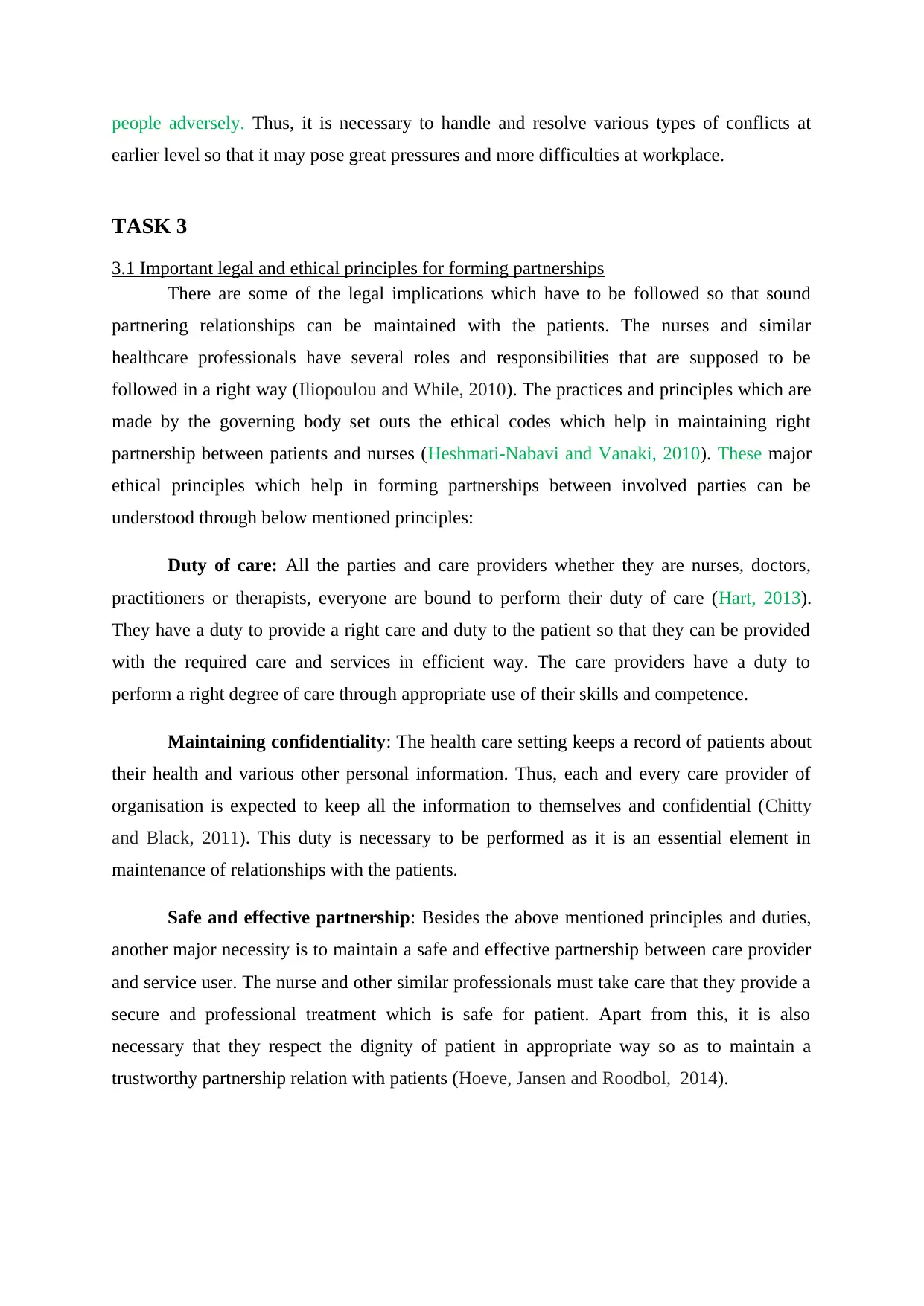
people adversely. Thus, it is necessary to handle and resolve various types of conflicts at
earlier level so that it may pose great pressures and more difficulties at workplace.
TASK 3
3.1 Important legal and ethical principles for forming partnerships
There are some of the legal implications which have to be followed so that sound
partnering relationships can be maintained with the patients. The nurses and similar
healthcare professionals have several roles and responsibilities that are supposed to be
followed in a right way (Iliopoulou and While, 2010). The practices and principles which are
made by the governing body set outs the ethical codes which help in maintaining right
partnership between patients and nurses (Heshmati-Nabavi and Vanaki, 2010). These major
ethical principles which help in forming partnerships between involved parties can be
understood through below mentioned principles:
Duty of care: All the parties and care providers whether they are nurses, doctors,
practitioners or therapists, everyone are bound to perform their duty of care (Hart, 2013).
They have a duty to provide a right care and duty to the patient so that they can be provided
with the required care and services in efficient way. The care providers have a duty to
perform a right degree of care through appropriate use of their skills and competence.
Maintaining confidentiality: The health care setting keeps a record of patients about
their health and various other personal information. Thus, each and every care provider of
organisation is expected to keep all the information to themselves and confidential (Chitty
and Black, 2011). This duty is necessary to be performed as it is an essential element in
maintenance of relationships with the patients.
Safe and effective partnership: Besides the above mentioned principles and duties,
another major necessity is to maintain a safe and effective partnership between care provider
and service user. The nurse and other similar professionals must take care that they provide a
secure and professional treatment which is safe for patient. Apart from this, it is also
necessary that they respect the dignity of patient in appropriate way so as to maintain a
trustworthy partnership relation with patients (Hoeve, Jansen and Roodbol, 2014).
earlier level so that it may pose great pressures and more difficulties at workplace.
TASK 3
3.1 Important legal and ethical principles for forming partnerships
There are some of the legal implications which have to be followed so that sound
partnering relationships can be maintained with the patients. The nurses and similar
healthcare professionals have several roles and responsibilities that are supposed to be
followed in a right way (Iliopoulou and While, 2010). The practices and principles which are
made by the governing body set outs the ethical codes which help in maintaining right
partnership between patients and nurses (Heshmati-Nabavi and Vanaki, 2010). These major
ethical principles which help in forming partnerships between involved parties can be
understood through below mentioned principles:
Duty of care: All the parties and care providers whether they are nurses, doctors,
practitioners or therapists, everyone are bound to perform their duty of care (Hart, 2013).
They have a duty to provide a right care and duty to the patient so that they can be provided
with the required care and services in efficient way. The care providers have a duty to
perform a right degree of care through appropriate use of their skills and competence.
Maintaining confidentiality: The health care setting keeps a record of patients about
their health and various other personal information. Thus, each and every care provider of
organisation is expected to keep all the information to themselves and confidential (Chitty
and Black, 2011). This duty is necessary to be performed as it is an essential element in
maintenance of relationships with the patients.
Safe and effective partnership: Besides the above mentioned principles and duties,
another major necessity is to maintain a safe and effective partnership between care provider
and service user. The nurse and other similar professionals must take care that they provide a
secure and professional treatment which is safe for patient. Apart from this, it is also
necessary that they respect the dignity of patient in appropriate way so as to maintain a
trustworthy partnership relation with patients (Hoeve, Jansen and Roodbol, 2014).
Paraphrase This Document
Need a fresh take? Get an instant paraphrase of this document with our AI Paraphraser
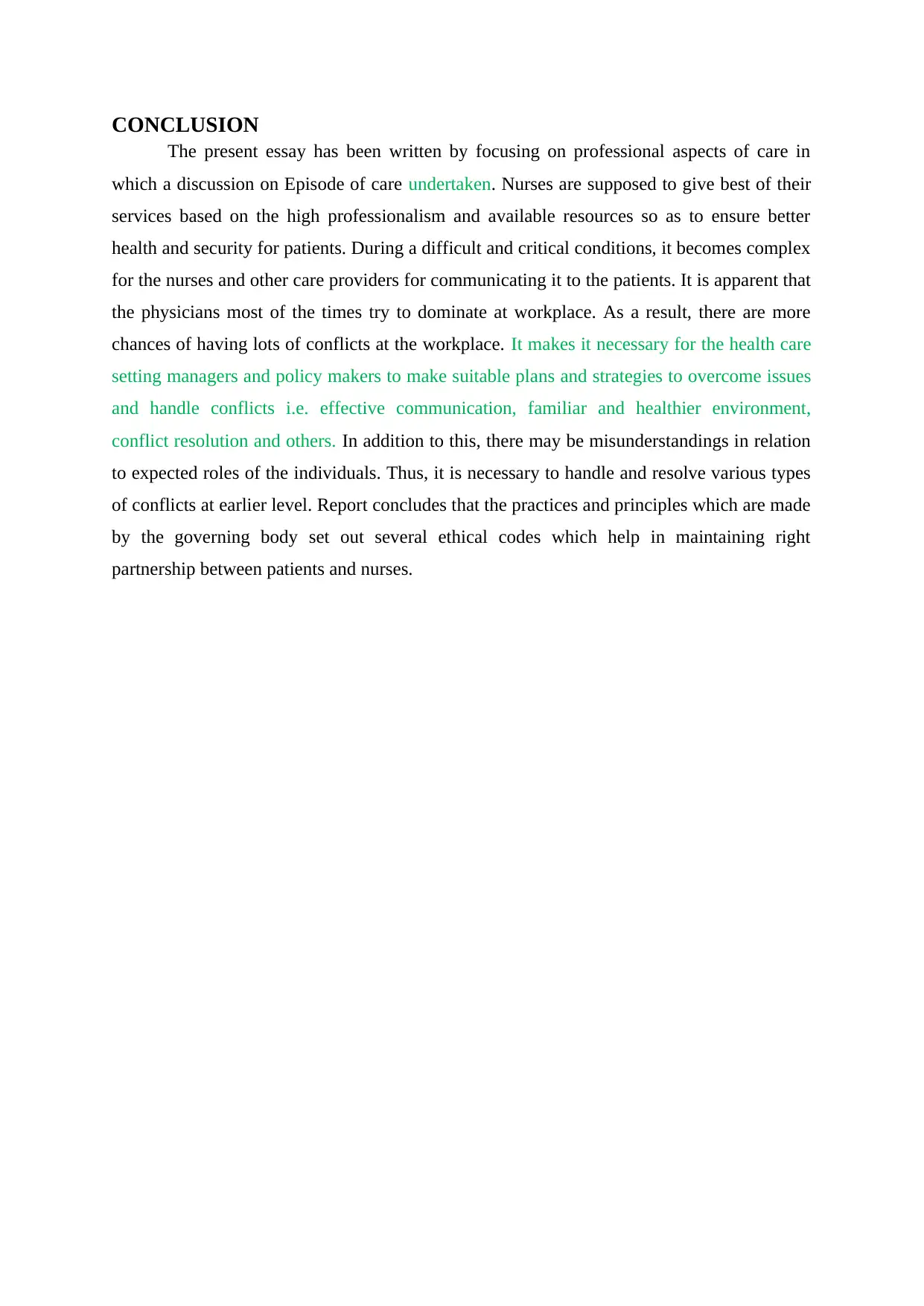
CONCLUSION
The present essay has been written by focusing on professional aspects of care in
which a discussion on Episode of care undertaken. Nurses are supposed to give best of their
services based on the high professionalism and available resources so as to ensure better
health and security for patients. During a difficult and critical conditions, it becomes complex
for the nurses and other care providers for communicating it to the patients. It is apparent that
the physicians most of the times try to dominate at workplace. As a result, there are more
chances of having lots of conflicts at the workplace. It makes it necessary for the health care
setting managers and policy makers to make suitable plans and strategies to overcome issues
and handle conflicts i.e. effective communication, familiar and healthier environment,
conflict resolution and others. In addition to this, there may be misunderstandings in relation
to expected roles of the individuals. Thus, it is necessary to handle and resolve various types
of conflicts at earlier level. Report concludes that the practices and principles which are made
by the governing body set out several ethical codes which help in maintaining right
partnership between patients and nurses.
The present essay has been written by focusing on professional aspects of care in
which a discussion on Episode of care undertaken. Nurses are supposed to give best of their
services based on the high professionalism and available resources so as to ensure better
health and security for patients. During a difficult and critical conditions, it becomes complex
for the nurses and other care providers for communicating it to the patients. It is apparent that
the physicians most of the times try to dominate at workplace. As a result, there are more
chances of having lots of conflicts at the workplace. It makes it necessary for the health care
setting managers and policy makers to make suitable plans and strategies to overcome issues
and handle conflicts i.e. effective communication, familiar and healthier environment,
conflict resolution and others. In addition to this, there may be misunderstandings in relation
to expected roles of the individuals. Thus, it is necessary to handle and resolve various types
of conflicts at earlier level. Report concludes that the practices and principles which are made
by the governing body set out several ethical codes which help in maintaining right
partnership between patients and nurses.
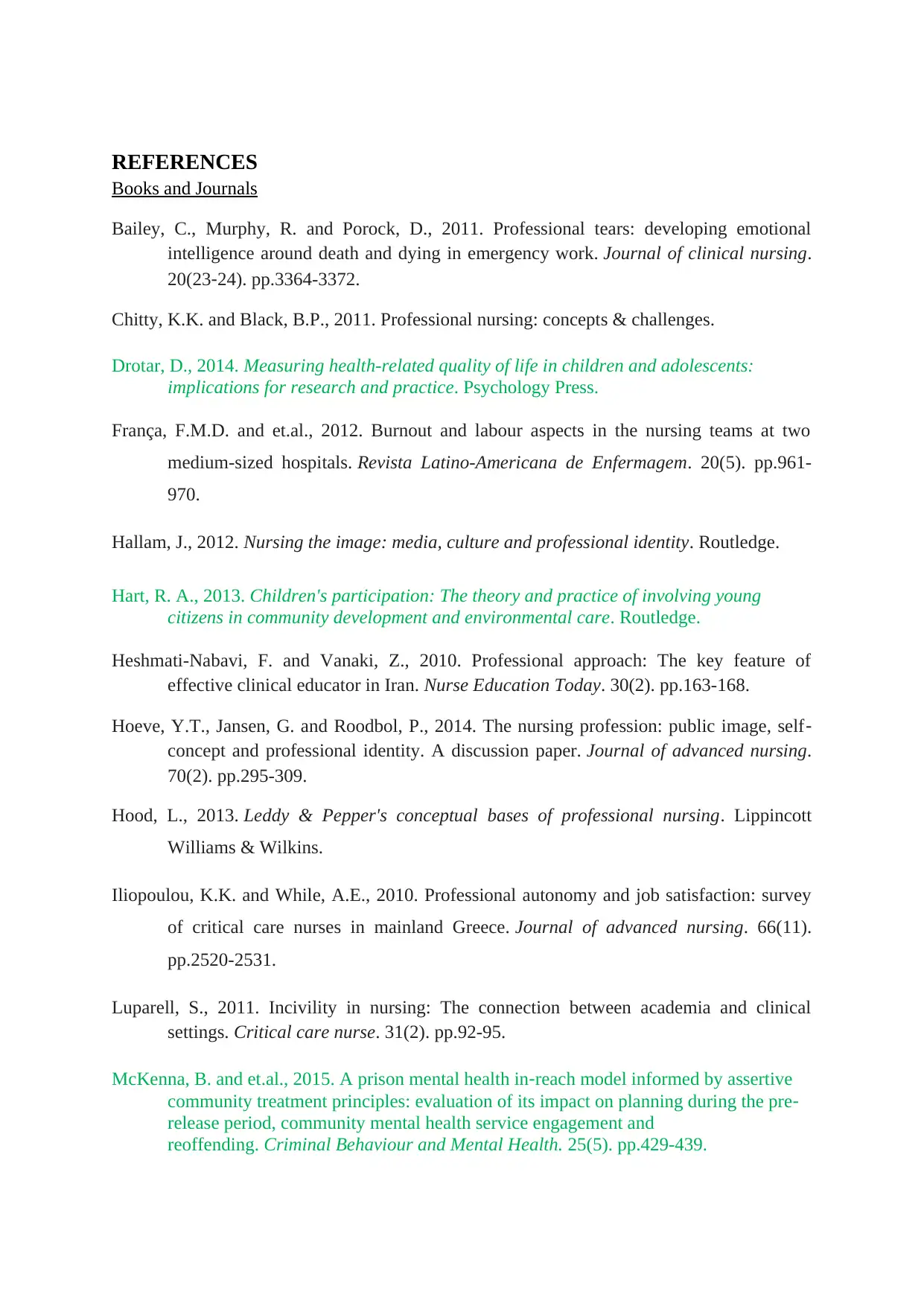
REFERENCES
Books and Journals
Bailey, C., Murphy, R. and Porock, D., 2011. Professional tears: developing emotional
intelligence around death and dying in emergency work. Journal of clinical nursing.
20(23‐24). pp.3364-3372.
Chitty, K.K. and Black, B.P., 2011. Professional nursing: concepts & challenges.
Drotar, D., 2014. Measuring health-related quality of life in children and adolescents:
implications for research and practice. Psychology Press.
França, F.M.D. and et.al., 2012. Burnout and labour aspects in the nursing teams at two
medium-sized hospitals. Revista Latino-Americana de Enfermagem. 20(5). pp.961-
970.
Hallam, J., 2012. Nursing the image: media, culture and professional identity. Routledge.
Hart, R. A., 2013. Children's participation: The theory and practice of involving young
citizens in community development and environmental care. Routledge.
Heshmati-Nabavi, F. and Vanaki, Z., 2010. Professional approach: The key feature of
effective clinical educator in Iran. Nurse Education Today. 30(2). pp.163-168.
Hoeve, Y.T., Jansen, G. and Roodbol, P., 2014. The nursing profession: public image, self‐
concept and professional identity. A discussion paper. Journal of advanced nursing.
70(2). pp.295-309.
Hood, L., 2013. Leddy & Pepper's conceptual bases of professional nursing. Lippincott
Williams & Wilkins.
Iliopoulou, K.K. and While, A.E., 2010. Professional autonomy and job satisfaction: survey
of critical care nurses in mainland Greece. Journal of advanced nursing. 66(11).
pp.2520-2531.
Luparell, S., 2011. Incivility in nursing: The connection between academia and clinical
settings. Critical care nurse. 31(2). pp.92-95.
McKenna, B. and et.al., 2015. A prison mental health in‐reach model informed by assertive
community treatment principles: evaluation of its impact on planning during the pre‐
release period, community mental health service engagement and
reoffending. Criminal Behaviour and Mental Health. 25(5). pp.429-439.
Books and Journals
Bailey, C., Murphy, R. and Porock, D., 2011. Professional tears: developing emotional
intelligence around death and dying in emergency work. Journal of clinical nursing.
20(23‐24). pp.3364-3372.
Chitty, K.K. and Black, B.P., 2011. Professional nursing: concepts & challenges.
Drotar, D., 2014. Measuring health-related quality of life in children and adolescents:
implications for research and practice. Psychology Press.
França, F.M.D. and et.al., 2012. Burnout and labour aspects in the nursing teams at two
medium-sized hospitals. Revista Latino-Americana de Enfermagem. 20(5). pp.961-
970.
Hallam, J., 2012. Nursing the image: media, culture and professional identity. Routledge.
Hart, R. A., 2013. Children's participation: The theory and practice of involving young
citizens in community development and environmental care. Routledge.
Heshmati-Nabavi, F. and Vanaki, Z., 2010. Professional approach: The key feature of
effective clinical educator in Iran. Nurse Education Today. 30(2). pp.163-168.
Hoeve, Y.T., Jansen, G. and Roodbol, P., 2014. The nursing profession: public image, self‐
concept and professional identity. A discussion paper. Journal of advanced nursing.
70(2). pp.295-309.
Hood, L., 2013. Leddy & Pepper's conceptual bases of professional nursing. Lippincott
Williams & Wilkins.
Iliopoulou, K.K. and While, A.E., 2010. Professional autonomy and job satisfaction: survey
of critical care nurses in mainland Greece. Journal of advanced nursing. 66(11).
pp.2520-2531.
Luparell, S., 2011. Incivility in nursing: The connection between academia and clinical
settings. Critical care nurse. 31(2). pp.92-95.
McKenna, B. and et.al., 2015. A prison mental health in‐reach model informed by assertive
community treatment principles: evaluation of its impact on planning during the pre‐
release period, community mental health service engagement and
reoffending. Criminal Behaviour and Mental Health. 25(5). pp.429-439.
⊘ This is a preview!⊘
Do you want full access?
Subscribe today to unlock all pages.

Trusted by 1+ million students worldwide
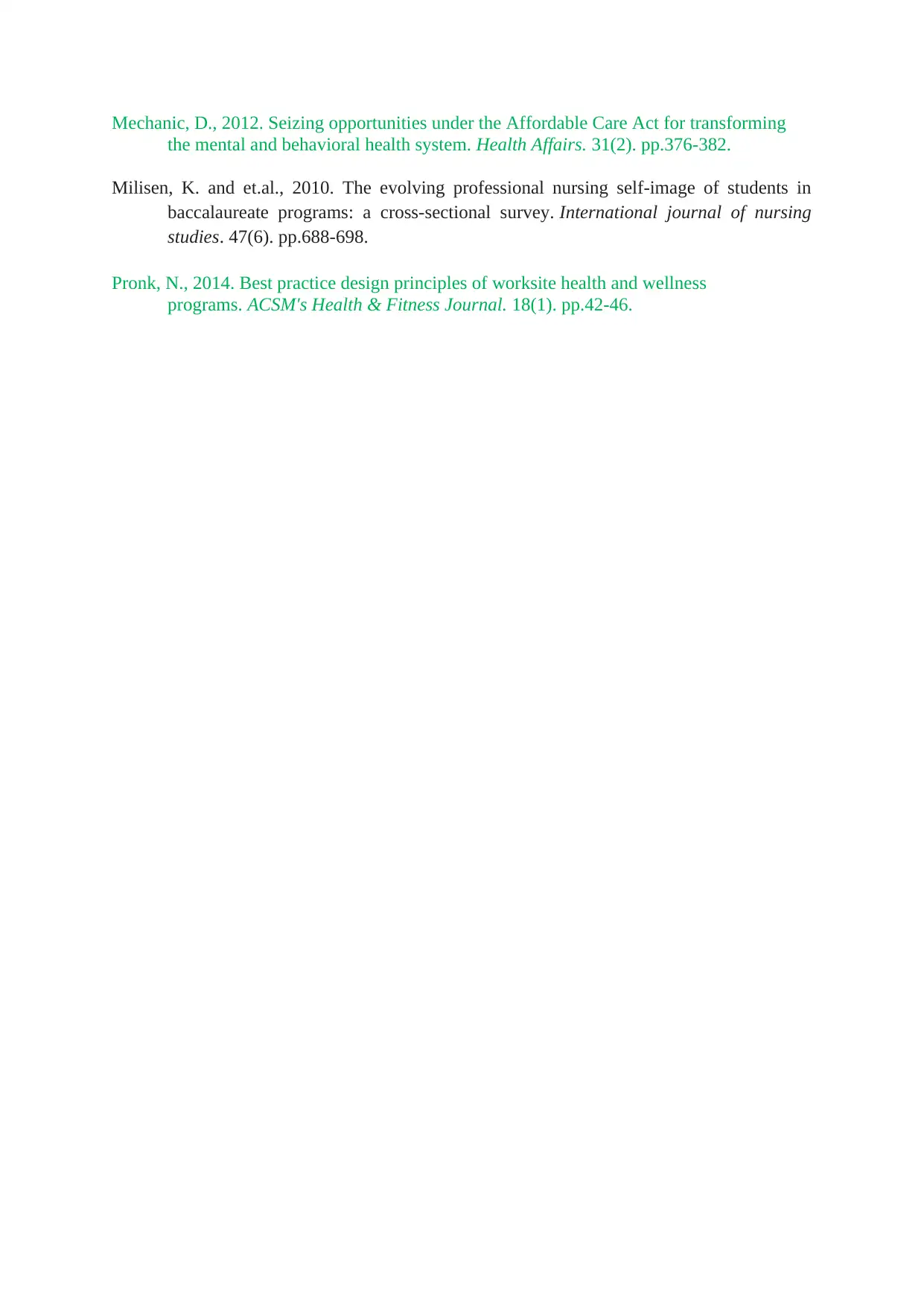
Mechanic, D., 2012. Seizing opportunities under the Affordable Care Act for transforming
the mental and behavioral health system. Health Affairs. 31(2). pp.376-382.
Milisen, K. and et.al., 2010. The evolving professional nursing self-image of students in
baccalaureate programs: a cross-sectional survey. International journal of nursing
studies. 47(6). pp.688-698.
Pronk, N., 2014. Best practice design principles of worksite health and wellness
programs. ACSM's Health & Fitness Journal. 18(1). pp.42-46.
the mental and behavioral health system. Health Affairs. 31(2). pp.376-382.
Milisen, K. and et.al., 2010. The evolving professional nursing self-image of students in
baccalaureate programs: a cross-sectional survey. International journal of nursing
studies. 47(6). pp.688-698.
Pronk, N., 2014. Best practice design principles of worksite health and wellness
programs. ACSM's Health & Fitness Journal. 18(1). pp.42-46.
1 out of 10
Related Documents
Your All-in-One AI-Powered Toolkit for Academic Success.
+13062052269
info@desklib.com
Available 24*7 on WhatsApp / Email
![[object Object]](/_next/static/media/star-bottom.7253800d.svg)
Unlock your academic potential
Copyright © 2020–2026 A2Z Services. All Rights Reserved. Developed and managed by ZUCOL.





